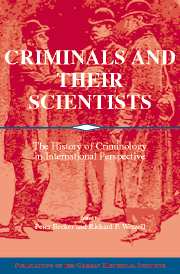Book contents
- Frontmatter
- Introduction
- Part One Nonacademic sites of Nineteenth-Century Criminological Discourse
- 1 The French Revolution and the Origins of French Criminology
- 2 Murderers and “Reasonable Men”: The “Criminology” of the Victorian Judiciary
- 3 Unmasking Counterhistory: An Introductory Exploration of Criminality and the Jewish Question
- 4 Moral Discourse and Reform in Urban Germany, 1880s-1914
- 5 The Criminologists’ Gaze at the Underworld: Toward an Archaeology of Criminological Writing
- Part Two Criminology as Scientific and Political Practice in the Late Nineteenth and Early Twentieth Centuries
- Part Three The Making of the Criminologist
- Part Four Criminology in the First Half of the Twentieth Century: The Case of Weimar and Nazi Germany
- Index
5 - The Criminologists’ Gaze at the Underworld: Toward an Archaeology of Criminological Writing
Published online by Cambridge University Press: 05 January 2013
- Frontmatter
- Introduction
- Part One Nonacademic sites of Nineteenth-Century Criminological Discourse
- 1 The French Revolution and the Origins of French Criminology
- 2 Murderers and “Reasonable Men”: The “Criminology” of the Victorian Judiciary
- 3 Unmasking Counterhistory: An Introductory Exploration of Criminality and the Jewish Question
- 4 Moral Discourse and Reform in Urban Germany, 1880s-1914
- 5 The Criminologists’ Gaze at the Underworld: Toward an Archaeology of Criminological Writing
- Part Two Criminology as Scientific and Political Practice in the Late Nineteenth and Early Twentieth Centuries
- Part Three The Making of the Criminologist
- Part Four Criminology in the First Half of the Twentieth Century: The Case of Weimar and Nazi Germany
- Index
Summary
When criminologists scrutinized the bodies and minds of criminals at the end of the nineteenth century, they explored new fields of criminological evidence but lost sight of the social practices and everyday lives of their subjects. They met criminals in hospital wards and penitentiaries where the subjects of their intellectual curiosity were removed from their proper social, cultural, and familial matrix. Within this institutional setting criminologists had only restricted access to criminals' identities. This restriction was not seen as a real constraint because it was fully compatible with the criminologists' conceptual framework. Only on some occasions did criminologists feel the need to include additional evidence in their narratives that lay beyond the reach of clinical experiments and anthropological examinations. When they felt compelled to introduce information about the criminals' lifeworld, reproduction, habits, and social institutions, criminologists usually turned to literary accounts and the knowledge of practitioners in the field, such as the German police expert Friedrich Christian Benedikt Avé-Lallemant, who was writing several decades earlier than his criminological counterparts.
Criminological discourse underwent a systematic transformation during the last decades of the nineteenth century. Practitioners working in the field of crime detection and prevention, and arguing from the perspective of a moral-ethical paradigm, lost ground. Their role in the production of criminological knowledge was taken over by doctors, anthropologists, psychiatrists, and criminal law experts who looked at the problem of crime and deviance from the perspective of social and/or biological determinism. These authors had difficulty integrating the knowledge of practitioners and medical experts of the first two-thirds of the nineteenth century into their narratives, as they were based on a different master narrative.
- Type
- Chapter
- Information
- Criminals and their ScientistsThe History of Criminology in International Perspective, pp. 105 - 134Publisher: Cambridge University PressPrint publication year: 2006
- 3
- Cited by



